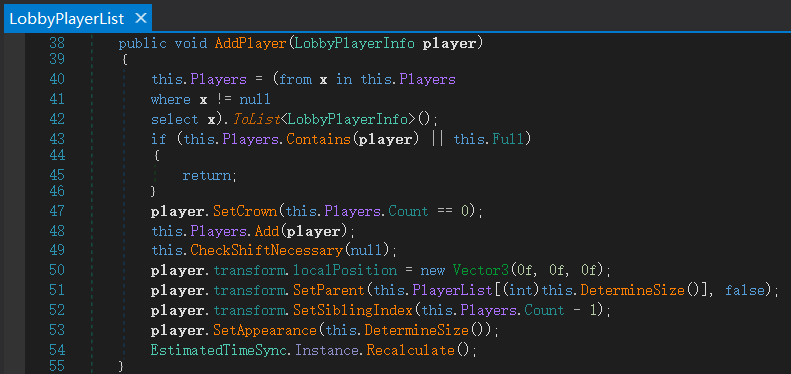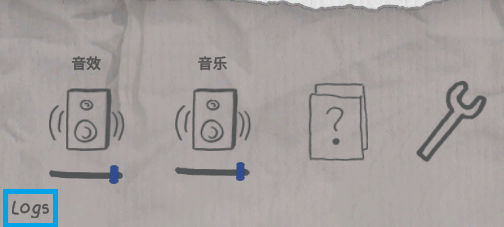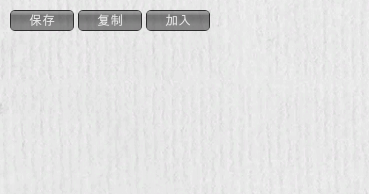概述
最近在Steam购买了你画我猜(Draw & Guess),游戏并不支持保存最近房间代码,以及玩家id。
由于众所周知的服务器原因(土豆做的),经常有人掉线或闪退(也可能是自己),重连后无法返回之前的房间。
于是考虑使用Mono注入技术,实现历史房间数据的保存。
逆向分析过程
文件结构分析
查看游戏目录结构,发现是使用Unity编写的Mono平台游戏,关键dll文件位于..\steamapps\common\Draw & Guess\Draw&Guess_Data\Managed,并且未加密。
房间代码生成
搜索RoomCode,定位到类RoomCodeEncoder,发现房间代码是由房主的SteamID进行base36编码生成,对应DecimalToArbitrarySystem函数。
ArbitraryToDecimalSystem函数用于将房间代码转换为SteamID,在MenuClicks.EnterRoomCode函数中被调用,通过LobbyManager的Join函数加入指定玩家的房间(如下图)

因此,只需记录玩家id,即可计算出房间代码。
PS:可通过http://steamcommunity.com/profiles/+steamID,打开个人主页
记录玩家id
搜索PlayerList,找到LobbyPlayerList和IngamePlayerList,分别对应匹配时玩家列表和游戏时玩家列表。
匹配时玩家列表
类结构:
public static LobbyPlayerList Instance;
public List<RectTransform> PlayerList = new List<RectTransform>();
public List<LobbyPlayerInfo> Players = new List<LobbyPlayerInfo>();
AddPlayer 函数:

可通过LobbyPlayerList.Instance.Players直接获取到玩家列表。
游戏时玩家列表
类结构:
private Dictionary<ulong, IngamePlayerListEntry> ContainedPlayers = new Dictionary<ulong, IngamePlayerListEntry>();
public static IngamePlayerList CurrentList;
AddPlayer 函数:

可使用IngamePlayerList.CurrentList的ContainedPlayers字段获取玩家列表,由于修饰符为private(非public),需要通过反射获取。
确定获取时机
查看AddPlayer调用栈:

由此可确定以下两个函数:
RoundManager.UserCode_RpcSetInfo(对应LobbyPlayerList)
LobbyPlayerInfo.UserCode_RpcSetPlayerInfo(对应IngamePlayerList)
注意到后者传入的是数组,推测该函数是每次按下Tab,显示玩家列表时调用,需要手动按键才能触发。
考虑到两者先后顺序(LobbyPlayerList先于IngamePlayerList),故选择使用LobbyPlayerList.Instance.Players获取玩家列表。
确定Hook函数
搜索字符串游戏将在,定位到SimplifiedChineseLocalisation.UIGameStartingIn变量,查看其调用栈:

双击UserCode_RpcGetCountdown函数,查看函数体:

功能是调用LobbyChat.Instance.ReceiveChat函数,更新聊天框内容
由此,选择在LobbyPlayerInfo.UserCode_RpcGetCountdown函数调用后(游戏即将开始时),保存房间代码及玩家列表。(保存上次调用时间,超过10秒则保存房间数据到本地)
同时,为了提示模块已经加载,选择在LobbyChat.Start函数调用后输出提示信息。
PS:由于LobbyChat实际上是更新一个TextMeshProUGUI(支持富文本标签),所以可以指定字体大小、颜色等属性。(在别人房间里发送,会被服务器断开连接)
TextMesh Pro支持的富文本标签见Rich Text
注入模块开发
基于MonoHook,开发一个注入dll
创建项目并导入依赖
在Visual Studio中创建一个.Net 4.0类库项目,将必要的游戏dll添加为依赖。
编写注入代码
此处仅贴出关键代码,完整项目代码见github:DAGHistory
模块加载提示
hook LobbyChat.Start函数,在聊天界面创建后输出信息。
public static void StartReplace()
{
// 先调用原函数
StartProxy();
// 输出信息到聊天框
LobbyChat.Instance.ReceiveChat("<color=#778899>[DAGHistory]: Loaded</color>");
}

自定义类RoomData
使用该类保存房间数据。
public class Player
{
ulong steamID;
string name;
public Player(string name, ulong steamID)
{
this.name = name;
this.steamID = steamID;
}
public string Name { get => name; set => name = value; }
public ulong SteamID { get => steamID; set => steamID = value; }
}
public class RoomData
{
string roomCode;
List<Player> playerList;
public string RoomCode { get => roomCode; set => roomCode = value; }
public List<Player> PlayerList { get => playerList; set => playerList = value; }
public override string ToString()
{
return JsonConvert.SerializeObject(this);
}
}
重载ToString函数,使用Json序列化该对象。
获取房间数据
遍历LobbyPlayerList.Instance.Players,并生成房间代码,保存到RoomData对象。
public static RoomData getRoomData()
{
RoomData roomData = new RoomData();
if (LobbyPlayerList.Instance != null && LobbyPlayerList.Instance.Players != null
&& LobbyPlayerList.Instance.Players.Count != 0)
{
List<LobbyPlayerInfo> players = LobbyPlayerList.Instance.Players;
roomData.PlayerList = new List<Player>();
for (int i = 0; i < players.Count; i++)
{
LobbyPlayerInfo lobbyPlayerInfo = players[i];
string name = lobbyPlayerInfo.Name;
ulong steamID = lobbyPlayerInfo.SteamID.m_SteamID;
if (i == 0)
{
roomData.RoomCode = CodeEncoder.codeEncode(steamID);
}
roomData.PlayerList.Add(new Player(name, steamID));
}
}
return roomData;
}
自动保存房间数据
hook LobbyPlayerInfo.UserCode_RpcGetCountdown函数,判断是否需要保存房间数据到文件。
public static void UserCode_RpcGetCountdownReplace(byte s)
{
// 调用原函数
UserCode_RpcGetCountdownProxy(s);
// 如果距离上一次调用该函数超过10秒,获取房间数据并保存到文件
if (Time.realtimeSinceStartup - lastCallTime > 10)
{
RoomUtil.saveRoomData();
LobbyChat.Instance.ReceiveChat("<color=#778899>[DAGHistory]: Saved</color>");
lastCallTime = Time.realtimeSinceStartup;
}
}
加入房间
分析发现该功能最终调用的是LobbyManager.s_Singleton.Join函数,传入steamID,照搬即可。
public static void joinRoom(string code)
{
if (code != null)
{
LobbyManager.s_Singleton.Join(CodeEncoder.codeDecode(code).ToString());
}
}
获取日志路径
参考LogFileOpener.ReturnLogPath函数,编写以下代码(将默认值替换为临时文件夹)。
private static string ReturnLogPath()
{
RuntimePlatform platform = Application.platform;
switch (platform)
{
case RuntimePlatform.OSXEditor:
case RuntimePlatform.OSXPlayer:
return "~/Library/Logs/Unity/";
case RuntimePlatform.LinuxPlayer:
case RuntimePlatform.LinuxEditor:
return Path.Combine("~/.config/unity3d", Application.companyName, "Draw_Guess");
case RuntimePlatform.WindowsPlayer:
return Path.Combine(Environment.GetEnvironmentVariable("AppData"), "..", "LocalLow",
Application.companyName, "Draw_Guess");
default:
return Path.GetTempPath();
}
}
点击左下角Logs打开该目录:

GUI
为方便使用,增加图形操作界面,提供手动保存、复制上局房间代码、加入上局房间功能。

并设置按后引号键(esc下方)隐藏该界面。
生成dll文件
在Visual Studio中选择生成DAGHistory,得到bin\Debug\DAGHistory.dll
测试
使用SharpMonoInjector
提供的命令行注入工具SharpMonoInjector.Console进行注入
注入dll并调用Load函数
将smi.exe、SharpMonoInjector.dll、待注入dll放到同一目录下,在该目录执行以下命令:
.\smi.exe -p "Draw&Guess" -a "DAGHistory.dll" -n "DAGHistory" -c "Loader" -m "Load" inject
之后使用相关功能即可。
查看日志
点击游戏左下角Logs打开日志目录(Windows:C:\Users\用户名\AppData\LocalLow\Acureus\Draw_Guess)
其中LastRoom.json和DAGHistory.log即注入模块生成的日志文件。
前者保存上次游玩的房间数据(用于复制代码及快速加入),后者保存历史记录。

 发表于 2021-8-2 16:24
发表于 2021-8-2 16:24
 发表于 2021-8-2 17:35
发表于 2021-8-2 17:35
 发表于 2021-8-2 17:04
发表于 2021-8-2 17:04
 发表于 2021-8-2 17:17
发表于 2021-8-2 17:17
 发表于 2021-8-2 20:08
发表于 2021-8-2 20:08
 发表于 2021-8-3 11:18
发表于 2021-8-3 11:18